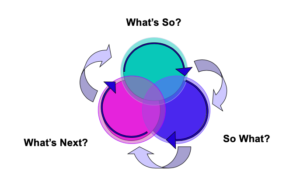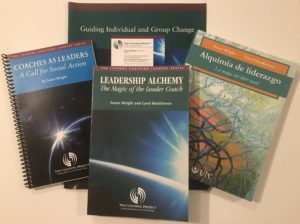The Coaching Project began in 1998, three friends working with leaders on using coaching as the way leadership was applied, to help them become Leader Coaches. Over the next fifteen years, the organization evolved into an international leadership development and executive education group with coaching at its core. With up to a dozen associates, TCP coached, trained, assessed and developed hundreds of managers and executives to lead by coaching. Client testimonials are at the bottom of this page. The following video gives an overview of our approach and some examples.
In the following section of the archive I have summarized The Coaching Project’s Principles, Process and Practice. These are offered as discovery if you haven’t been exposed to coaching before and as review if you’ve already been through our programs or others that are similar. On subsequent pages, you will find the full video and guidebook for Becoming a Leader Coach. Here you can dive in and learn all about this way of leading on your own or with a small group. There are also links to posts, presentations, processes and other materials you may find useful on the Resources page.
Leader Coach Principles:
Across all our assignments, we apply seven foundational principles that weave together philosophical and theoretical streams into a rich tapestry of learning themes strengthening the Leader Coach’s capacity for empathy, connection and effectiveness.
Adult Development: Adults move through a predictable sequence of developmental stages, each characterized by distinctive values, worldviews and behaviours. The dynamics of this spiral of development inform our perspectives on life, work, relationships and their meaning to us. Coaches who can identify these stages and work within them support healthy learning and development at the clients’ current stage and preparation for movement to the next.
Change: Coaching as a profession has emerged in response to the continuous turbulent change in our lives and our need for support to adapt and flourish in constant turmoil. Coaching is a client-directed learning and change process. As coaches, we model ‘thriving on chaos’ for our clients – we must not only appreciate change concepts but embody change practice in our own lives. By inquiring into our own attachments, filters and judgments, we are better prepared to understand our clients.
Multiple Perspectives: A fundamental role of the coach is to be able to see multiple perspectives, to support clients in expanding their awareness and creating a broader set of possibilities for the future. The more perspectives we hold, the more powerful our coaching. We often begin at the individual level, coaching one-on-one, then move to coaching teams and finally to whole organizational cultures. As coach educators, we begin by looking at ourselves as coaches, expand to include coaching as a professional community of practice, and finally consider coaches as leaders pioneering the global evolution of consciousness.
Self as Instrument: Coaching is as much about the coach as it is about the client. Developing an authentic coaching presence is a fundamental part of becoming a professional coach. In coaching, we bring ourselves as the safe container within which the client can trust that change is possible and take the first tentative steps toward a preferred future. We begin with ourselves, practice what we mean to preach, walk the path we espouse for others and understand what it feels like to step out of our comfort zone into the unknown.
Story: We use the timeless, universal principles of story to deepen our understanding and enrich our communication. An underlying narrative is woven into all of our conversations. Coaches are like investigative journalists observing both fact and fiction, knowing there is always more to the story. Being aware of our own and our clients’ stories is a powerful coaching tool for diagnosis and action.
The Quaternity: We exist in four dimensions in every moment and across our lifetimes. This quaternity includes the head, heart, body and spirit – a set of multiple intelligences we use to navigate in the world. When these elements are aligned, we are whole, authentic, effective human beings. However, we are often out of alignment on one or more dimensions. Coaches inquire into the quaternity in themselves and with their clients as a means of insight, balance and integration.
Unconditional Positive Regard: An essential aspect of the ‘DNA’ of coaching is the ability of the coach to hold the coaching client in what Carl Rogers called “Unconditional Positive Regard” (On Becoming a Person, 1961), to model integrity, respect, listening with deep generosity, and asking provocative questions. This ‘UPR’ opens a pathway to experimentation, to curiosity, to imagining a better future. Similarly, coaches hold teams and whole systems in an appreciative, positive perspective.
While these themes build our coaching muscle with a breadth of understanding, one cannot be a coach without actual practice. Therefore, the themes must be integrated into practical application and skills building – we learn by doing, by continuous learning to develop and sustain mastery. As we practice, we develop more complex perspectives, adding sophistication and nuance as we go.
Leader Coach Process:
Our process throughout was the same, whether in a coaching assignment, a training program, or a strategic planning project. The model is shown here:
The CPC coaching process is a simple three-stage structure that is applied at the individual, team and organizational levels. At each of these levels, the process begins by building the foundational trust that underpins the relationship, and precedes building new awareness out of dialogue, discovery, feedback and challenge. New insights lead to a reframing of the coaching issue such that clients can see how to build a new future and are motivated to accomplish the change.
The coaching process shown here represents a hologram – the whole is contained in the parts. Each stage has the same three elements as the whole relationship. For example, in Building Trust, there is trust building, awareness building and a step toward the future. Similarly, the whole coaching process is contained in any one interaction. A single coaching moment contains the same elements as the whole coaching process. Hence, the simple process becomes a rich multi-faceted structure that contains the roadmap for the coach in situations of varying scope and duration.
Each of the stages contains a number of steps that structure the unfolding relationship, and a central question that guides the inquiry. The process can be used at the individual level and with teams and whole organizational systems.
Leader Coach Practice:
We have developed an online program that leads you through the Becoming a Leader Coach process step by step. It consists of a series of videos guiding you through each stage with explanations, demonstrations and suggestions for practice. There is a companion Workbook that acts as a guide and resource to you on your journey.
What Clients Say…
Coaching Services:
“I want to thank you once again for your fabulous coaching! The time I spent with you was the catalyst for some really great things for me! I’m grateful for your honesty and help in identifying what was driving my dissatisfaction!” Insurance Executive
“What I found most valuable was the introduction to coaching competencies, reviewing the group results, and comparing myself to the rest of the managers in the organization.” Financial Executive
“I learned that coaching is the most fundamental aspect of managing!” Plant Manager
“Again, a big thank you for all your support last year. Your coaching has proven invaluable. So much so that I have my entire staff on development plans for next year, similar to the one we jointly created.” Financial Executive
“Thanks for your help in what was, even from the retrospective view of several years later, an incredibly difficult time for me. I appear to have successfully made some jump…thanks in no small part to you.” Media EVP
“Coaching is not something you just learn once and excel at. It is a dynamic role and something that you BE”. Director of Sales
“The coaching vs managing approach opens up the lines of communication – preventing a “directive” culture – we should adopt this throughout the organization.” General Manager
Coach Education:
“Great presentation and delivery of materials – very open and approachable method.” Operations Manager
“Thank you for the way in which you created a wonderful learning environment with a unique group. You are “Masters” at your trade.” CEO
“I found this course to be very informative and look forward to putting the process into practice.” Sales Manager
“The course was inspiring to me. It has stirred up feelings in me that I hadn’t felt in years and these feelings through reflection, peer coaching and group work have given me the desire to change the corporate world, starting with my company. I am more determined now to keep my faith in people and myself to build the business and work environment I’ve always desired.” Managing Partner
“The small group discussions were very important and beneficial. The cases were excellent.” Director of Systems Technology
“All the topics covered are applicable to my day to day activities in one way or the other and I will be able to apply all of this immediately.” Head of Travel Planning
